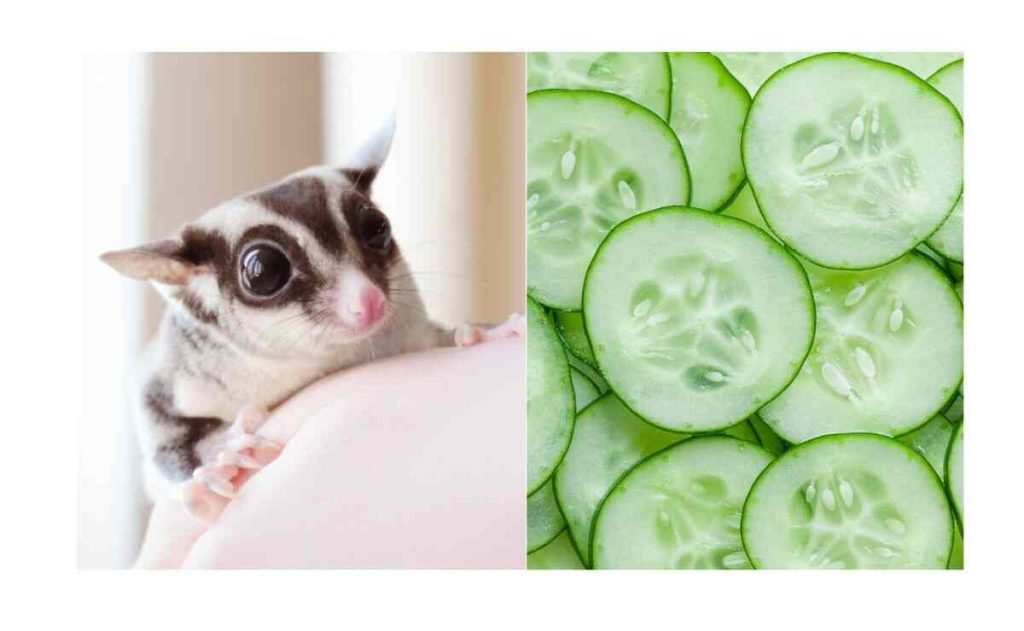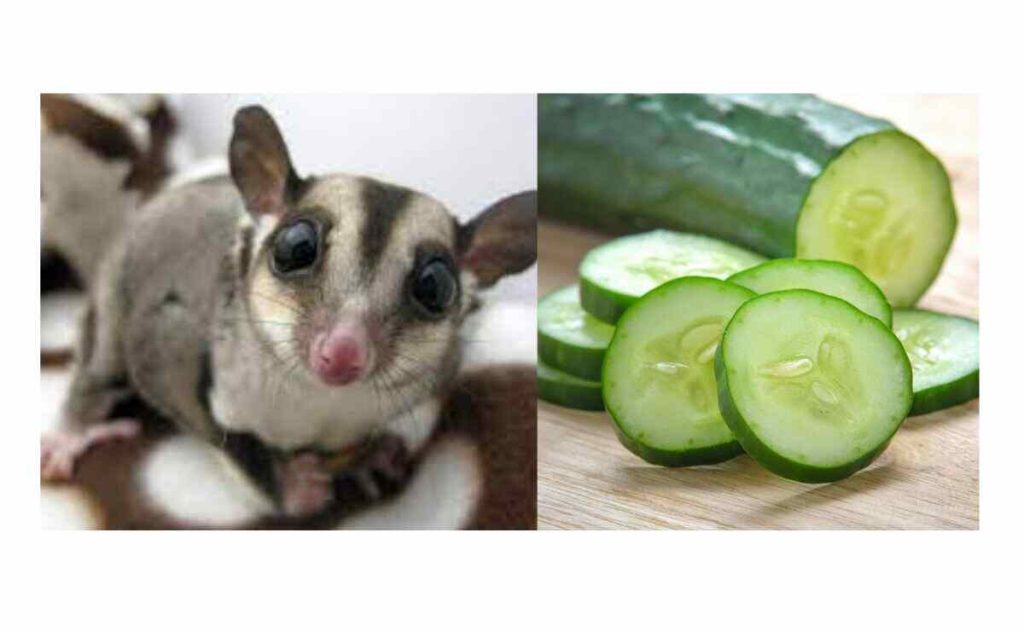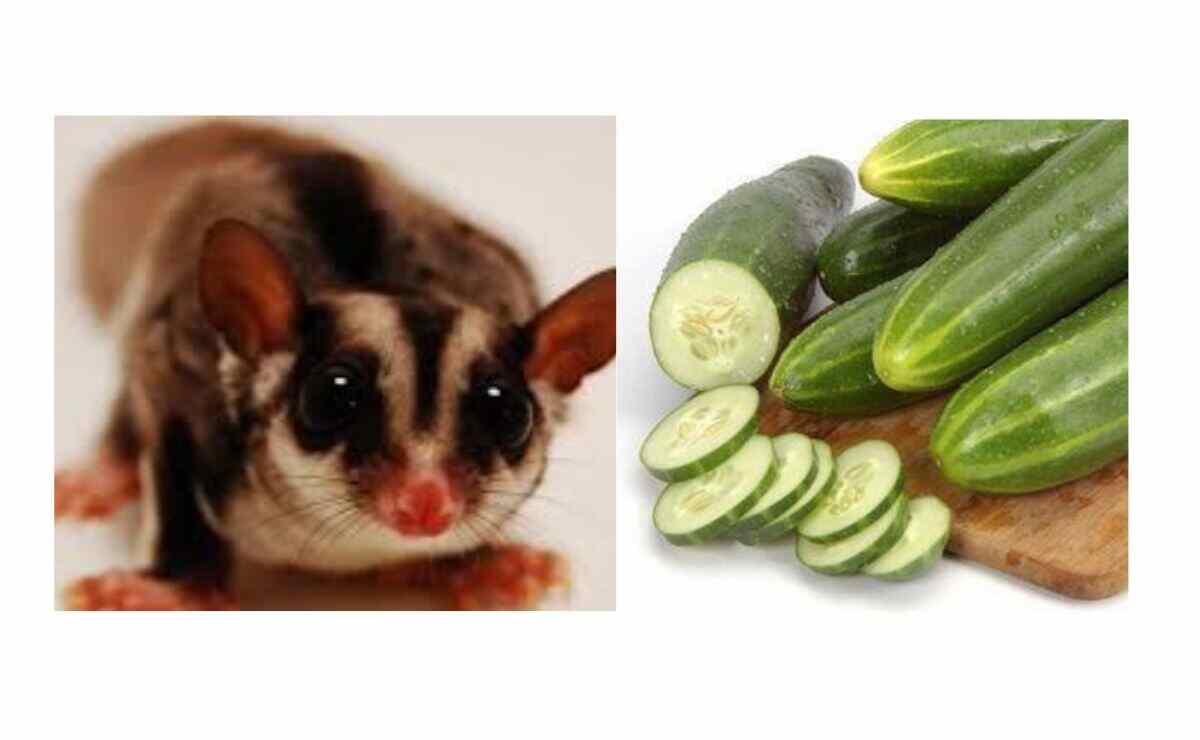Cucumber is a crispy, refreshing veggie that we all love to eat. But can our sweet, little sugar gliders eat cucumbers?
Here is the good news: yes, sugar gliders can eat cucumbers. There is nothing harmful or toxic element in the cucumbers for your pet. It is a good source of hydration and fiber. Also, it’s low in calories.
But you should remember that overfeeding anything to your sugar glider is not recommended. So be aware of the portion of cucumber. Read on to know more information about this interesting topic.
Can Sugar Gliders Eat Cucumbers?

Sugar gliders can eat cucumbers, but keeping a few things in mind is important. Cucumbers should be given to sugar gliders in moderation as part of a balanced diet.
Cucumbers are low in calories and high in water content, but they do not provide all of the necessary nutrients that sugar gliders need. So it is always recommended to offer a variety of fruits, vegetables, and proteins to ensure that your sugar glider is receiving a well-rounded diet.
When feeding cucumbers to sugar gliders, you need to maintain the proper way. Following it, you should remove the seeds and peel. The seeds can be a choking hazard and the peel can be difficult for them to digest.
Additionally, make sure that the cucumber is fresh and free from any pesticides or other harmful chemicals. Organic cucumbers are a good option if available.
As always, it is best to get advice from experienced sugar glider owners around you regarding the specific dietary needs of your pet.
Is Cucumbers Safe for Sugar Gliders?
Cucumbers are a safe and nutritious treat for your sugar gliders. Whether the cucumber type is, American cucumbers or English cucumbers, they are both safe for your gliders.
Many sugar glider owners claim that cucumber is not safe for gliders, which is not fully true though.
There are two prevalent reasons behind the misconceptions surrounding the feeding of cucumbers to sugar gliders.
One common belief suggests refraining from feeding sugar gliders fruits and vegetables with seeds. Cucumbers have seeds and often fall victim to this misconception. However, it’s important to note that not all seeds are harmful to gliders, and cucumber seeds are no exception.
Contrary to popular belief, cucumber seeds are safe for sugar gliders, and there is no evidence supporting the idea that they pose a threat to their health.
Another misconception revolves around the fibrous skin of cucumbers, with some fearing that it leads to digestive problems in sugar gliders. This, too, is a myth.
In reality, the fiber in cucumber skin is not harmful and neither interrupt regular passage of stool. There is no substantiated evidence to suggest that the skin of cucumbers causes any digestive troubles for sugar gliders.
Is Cucumber Toxic For Sugar Gliders?
Though cucumber is not toxic for sugar gliders, you should offer it as an occasional treat. Cucumbers don’t have proper nutritional value, so excessive improper nutritional food should be avoided.
Maintaining the calcium-to-phosphorus ratio is a key aspect of your Gilder’s health. While cucumbers are safe, it’s essential to integrate them into a well-rounded diet to prevent any imbalance that can affect your sugar baby’s health.
Is Cucumber Healthy for Sugar Gliders?

Cucumbers aren’t so nutritious fruit, but still, they provide some health benefits to your sugar gliders. The benefits of cucumbers extend beyond mere refreshment. For example:
Hydration Boost
The high water content in cucumbers serves as a natural hydrating agent for sugar gliders. Adequate hydration is essential for their health, and cucumbers offer a refreshing and water-packed solution to keep them well-hydrated. When the environment is too hot and your glider is dehydrated, you can offer some pieces of cucumber.
Vitamins and Minerals
Beyond hydration, cucumbers contain a rich array of vitamins and minerals, offering comprehensive support for sugar gliders’ overall health. These essential nutrients contribute to their vitality, ensuring they receive the necessary elements for optimal functioning.
Low-Calorie Snack
Cucumbers prove to be an ideal snack for sugar gliders, particularly for those prone to obesity. With low-calorie content, they offer a guilt-free treat, allowing gliders to indulge in a satisfying snack without the risk of excessive calorie intake.
Fiber for Digestive Health
The fiber content in cucumbers plays a crucial role in supporting healthy digestion. This is particularly vital for sugar gliders, as efficient digestion ensures the proper absorption of nutrients and promotes overall digestive well-being.
Is it safe for sugar gliders to eat cucumber seeds and skin?
When it comes to introducing fruits and vegetables into your sugar glider’s diet, a simple rule guides the way: if we eat it, they can eat it too. Cucumber seeds align perfectly with this principle, as sugar gliders can consume them without any issues.
Sugar gliders can munch on cucumber seeds without any problems. But it can cause a choking hazard, so you can avoid it. If gliders can consume seeds without any problem, then you can feed those seeds. So feed them with moderation.
However, when it comes to cucumber skin, there are some considerations to keep in mind. Many cucumbers available at grocery stores come coated with edible wax to enhance freshness. It is harmless for humans, but this wax can pose an issue for sugar gliders. It’s advisable to refrain from allowing your sugar glider to consume the wax-coated skin.
Washing the cucumber skin thoroughly is crucial. Sugar gliders are sensitive to pesticides commonly use in producing vegetables and fruits. If the cucumber is not organic, consider washing it diligently to remove any pesticide residues.
To address these concerns, some sugar glider owners opt for organic produce to ensure the absence of harmful pesticides. Alternatively, you can peel the cucumber before offering it to your sugar glider, so there will be no o worry about wax or pesticides.
Surprisingly, most sugar gliders won’t mind the absence of the skin and will happily devour the cucumber without noticing the difference.
Can Sugar Gliders Eat Cucumber Pickles?
There is a catch to the adage “pickles on the side” when it comes to sugar glider diets. Sugar gliders should generally avoid canned produce, including pickled cucumbers.
The canning process involves the use of additives and preservatives that, unfortunately, aren’t conducive to the sugar gliders. These elements are aimed at preserving the product for human consumption, but they may pose health risks for our small pets.
Pickled cucumbers often contain vinegar, salt, and other ingredients that are not suitable for a sugar glider’s delicate digestive system. These components, while enhancing the taste of humans, have no place in the dietary needs of sugar gliders.
With few exceptions, sugar gliders should not have any canned produce. This is unfortunately true with pickled cucumbers as well.
How Often Can Sugar Gliders Eat Cucumbers?
You should offer cucumber to your sugar gliders as a special treat. You can feed it to your gliders every other day but in a little portion. But firstly, observe how your gliders react to this new food.
Cucumbers, being high in water content, come with a slight risk of contributing to diarrhea. To mitigate this risk, start with a small slice when introducing cucumbers to your sugar glider. This cautious approach allows their digestive system to acclimate gradually.
If they enjoy cucumber, you can gradually increase the quantity in subsequent feedings. But never in excessive amounts.
Conclusion
Cucumbers are a safe occasional treat for sugar gliders, but you have to maintain a balanced diet. While cucumbers themselves are not nutritionally dense, they offer hydration and some essential vitamins.
As with any treat, moderation is the key to maintaining a healthy balance in your sugar gliders’ diet.
